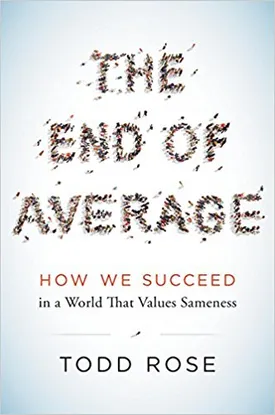The End of Average: How We Succeed in a World That Values Sameness by Todd Rose
In the book, The End of Average: How We Succeed in a World That Values Sameness, Todd Rose sets out to challenge the deep-rooted notion that society should judge individuals by their average traits. This book proposal also serves to ask a fundamental question; why do we insist on treating people as though they are all the same? Rose shows how this inherent obsession with averages can lead to disastrous effects, from curricula that forget about individual needs to jobs that kids outgrow in five minutes.
Rose begins the book by discussing the concept of the “average.” To him, the average is the most disastrous idea in society, but it is so deeply rooted in the collective consciousness that we often don’t even notice it. Instead of focusing on individual’s uniqueness, we are too quickly drawn into the buzzword of “average”. The author notes that this obsession with the average can lead to grave consequences, such as overly general and ill-fitting instruction in classrooms or poorly fitting jobs.
Rose then continues to make the argument that society needs to put more emphasis on the individual if real success is to be achieved. For example, Rose discusses the “jaggedness” of every individual; we each have our own unique set of skills, talents, and traits. It is this suggestion that people should be judged on the jaggedness of their profile, and not their average numbers, that drives home Rose’s message that society would be better off treating the individual as separate from the average.
Next, Rose points to alternative systems, such as the U.S. Navy’s decision to recruit trainees based on their individual aptitudes instead of their average tests scores. This system had a positive effect on the Navy’s recruitment process. Rose uses this example to show how performance can be improved when the individual is taken into account. He also points out that other businesses, such as Google and Microsoft, have also incorporated the idea of looking to the individual when hiring in order to create better-fitting and potentially more successful teams.
Finally, the author focus on the practical application of his ideas. Rose offers advice for educators, parents, and business-owners alike on how to incorporate the life-changing benefits of considering the individual and moving away from relying on averages. In the book, Rose provides strategies, such as personalized and competency-based assessments, targeted learning plans, and real-world personal narratives, that help shift the emphasis away from averages and onto individual success.
Rose’s The End of Average: How We Succeed in a World That Values Sameness is an invaluable resource to anyone concerned with individual success amidst a society obsessed with the average. By challenging the “average” falsehood and providing alternative approaches to success and performance, Rose gives readers a refreshing and novel approach to a world filled with sameness and “average” standards.

